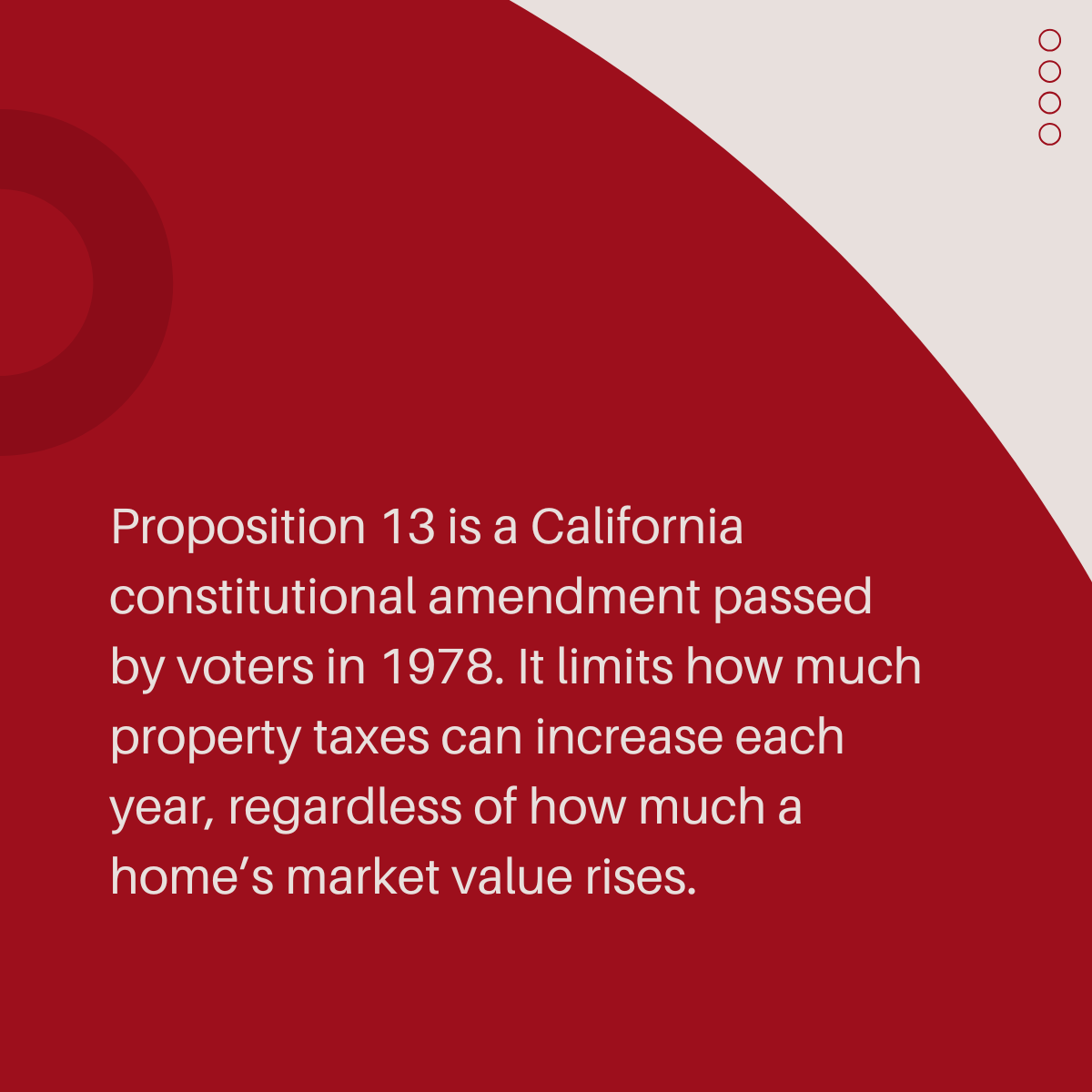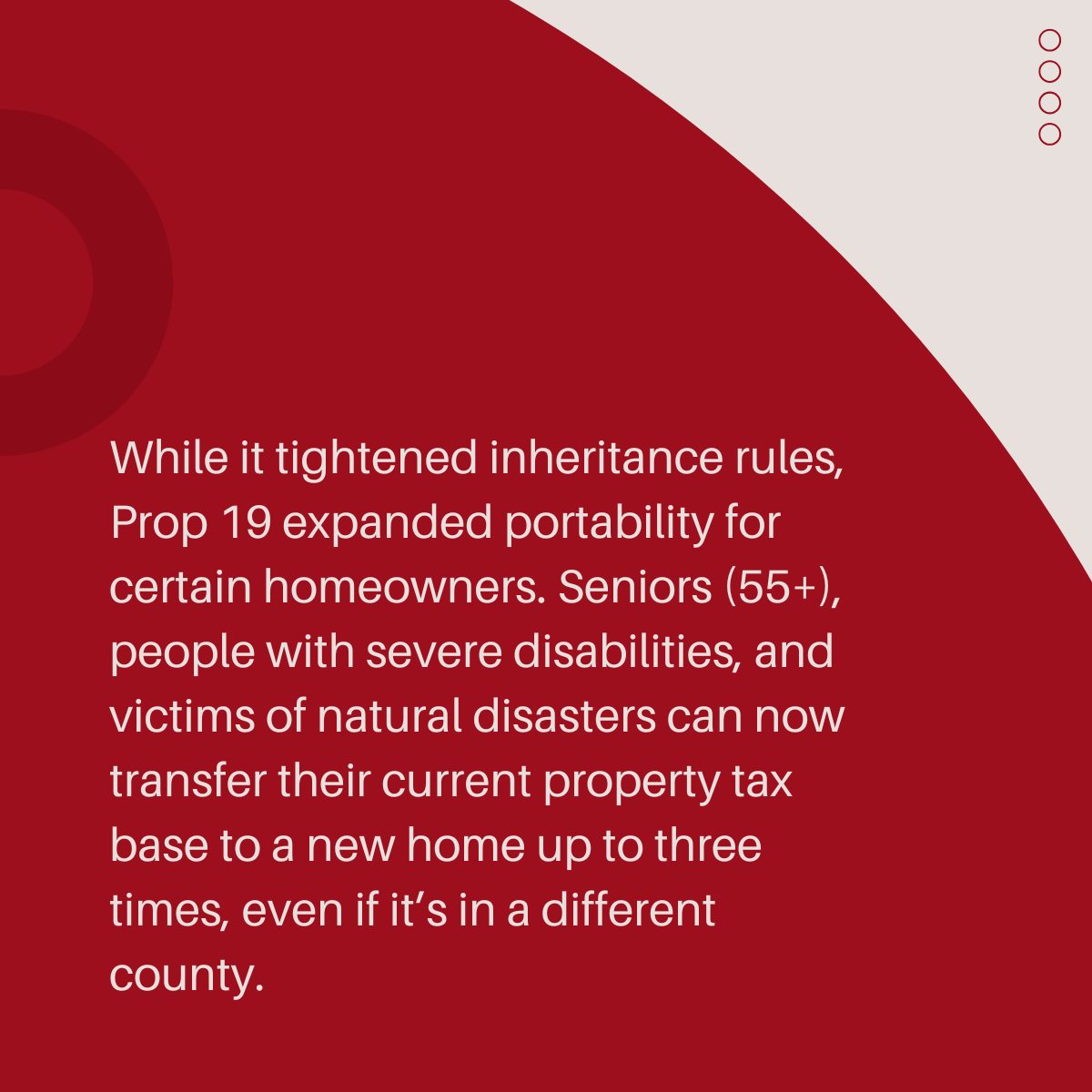
What California Homeowners Need to Know About Proposition 13
Originally passed in 1978, Proposition 13 was designed to protect homeowners from sudden spikes in property taxes. But over the years, it has also created confusion, inequities, and legal gray areas that many homeowners don’t fully understand.
This article breaks down what Proposition 13 means, how it works, and when you might need guidance from a real estate attorney, especially if you’re navigating complex issues like inheritance, ownership transfers, or reassessments.
What Is Proposition 13?
Proposition 13 is a California constitutional amendment passed by voters in 1978. It limits how much property taxes can increase each year, regardless of how much a home’s market value rises. Under Prop 13, a property’s assessed value for tax purposes is based on its purchase price, not its current market value. This means that even if your home appreciates significantly over time, your property tax bill stays relatively predictable.
For many homeowners, this law offers long-term tax stability. But it can also create disparities. Neighbors in similar homes might pay drastically different tax bills depending on when they bought their properties.
Understanding these rules is crucial if you’re buying, inheriting, or transferring property in California. And because the law is complex, many turn to real estate attorneys or real estate law firms to ensure they stay compliant and take advantage of available protections.

How Prop 13 Affects Property Taxes
Proposition 13 significantly impacts how property taxes are calculated—and who ends up paying more. Because it bases taxes on the original purchase price rather than current market value, longtime homeowners often pay far less than their newer neighbors, even for comparable properties.
Here’s how it works in more detail:
Initial Assessment: When you buy a home in California, the county assessor assigns your property an assessed value equal to its purchase price. This becomes your “base year value.”
Annual Increases Capped: After your first year of ownership, your assessed value can only increase by a maximum of 2% per year, regardless of how much your home’s market value increases. This is key—your taxes aren’t tied to the volatile housing market but are instead stable and predictable over time.
Tax Rate: The property tax rate is set at 1% of your assessed value, plus any voter-approved local taxes or fees for things like schools or infrastructure.
Reassessment Triggers: Your property will only be reassessed (i.e., the value reset to current market rates) when there’s a change in ownership or major improvements made to the home, such as adding a new room or converting a garage into livable space.
So, someone who bought a house in 1995 for $200,000 might still be paying taxes based on an assessed value around $300,000, while a neighbor who bought the same model home last year for $900,000 could be taxed at nearly triple the amount.
Impacts on Home Value and the Real Estate Market
Proposition 13 doesn’t just affect your tax bill. It also shapes the entire California real estate market. While the law provides predictability for long-term homeowners, it also creates ripple effects that influence buyer behavior, inventory levels, and even home prices.
- Reduced Mobility
Because Prop 13 ties low tax rates to long-term ownership, many homeowners hesitate to sell their homes. Moving would trigger a reassessment at market value, resulting in a much higher property tax bill on the new home even if it’s smaller or similar in price. This “golden handcuff” effect discourages people from downsizing or relocating, which reduces housing turnover.
- Limited Inventory
With fewer people listing their homes, inventory stays low especially in high-demand areas like San Diego. This scarcity drives up home prices, making it even harder for first-time buyers to enter the market.
- Market Inequity
The result is a tax system where two homeowners in identical homes could be paying drastically different amounts depending on when they bought. That can feel unfair, especially to newer buyers who shoulder a greater share of the local tax burden.
- Investment Strategy Shifts
Investors and real estate developers must account for Prop 13’s rules when acquiring or flipping properties. Strategic planning is essential, and many seek guidance from real estate law firms to ensure they stay compliant and avoid costly surprises.
In short, Proposition 13 offers security but can also distort the housing market. Whether you’re buying, selling, or holding, it’s important to consider how this law impacts your financial decisions and consult a real estate attorney near you when you’re unsure.

Inheritance, Transfers, and Prop 19 Changes
For years, Proposition 13’s benefits could be passed down from parents to children through inheritance or intergenerational transfers. This often keeps tax assessments artificially low across generations. But with the passage of Proposition 19 in 2020, those rules changed significantly.
Here’s what you need to know now:
- Parent-to-Child Transfers Are More Limited
Previously, parents could transfer a primary residence (and up to $1 million of other property) to their children without triggering a reassessment. Now, under Prop 19:
- The child must use the inherited home as their primary residence to retain the low tax basis.
- If they don’t move in, the property is reassessed at market value.
- Even if the child does move in, the benefit only applies to the first $1 million in market value above the home’s taxable value.
- Grandparent Transfers Also Affected
Transfers from grandparents to grandchildren (skipping a generation) are also impacted and now face similar restrictions.
- Prop 19 Offers Some Benefits for Seniors and Disaster Victims
While it tightened inheritance rules, Prop 19 expanded portability for certain homeowners. Seniors (55+), people with severe disabilities, and victims of natural disasters can now transfer their current property tax base to a new home up to three times, even if it’s in a different county.
These changes have made estate planning much more complex. If you’re passing property to your children or receiving one from a parent, it’s crucial to understand how these rules apply to your situation. A qualified real estate lawyer can help you navigate the fine print, minimize tax exposure, and avoid unintended reassessments.
FAQs About Proposition 13
- Can my property taxes increase if I renovate my home?
Yes, certain improvements can trigger a reassessment. Adding square footage, a new room, or a second story are considered new construction and may raise your assessed value. However, repairs or replacements (like a new roof or kitchen remodel) generally do not.
- What happens if I add someone to the deed?
It depends. Adding a spouse usually does not trigger reassessment, but adding a child, friend, or business partner might. Always consult with a real estate attorney before making ownership changes to avoid unintended tax increases.
- Does Proposition 13 apply to second homes or rental properties?
Yes, Prop 13 applies to all California properties, not just primary residences. However, the benefits of Prop 13 on inherited second homes have been reduced significantly by Prop 19 especially if the new owner doesn’t move in.
- Can I appeal a reassessment?
Absolutely. If you believe your home has been reassessed unfairly, you can appeal with your county assessor. A real estate lawyer near you can help gather evidence, file the proper paperwork, and represent you during the process.
- I’m planning to sell and buy a new home. Will my taxes go up?
Most likely, yes. When you sell, your old tax base is lost, and the new property will be assessed at its current market value. However, under Prop 19, eligible seniors and people with disabilities may transfer their existing tax base to a new home, if certain criteria are met.

Conclusion
Proposition 13 affects the way Californians buy, sell, inherit, and hold on to property. However, with the added changes under Prop 19, it’s easier than ever to make a costly mistake without realizing it. Whether you’re navigating an ownership transfer, dealing with a reassessment, or planning your estate, having a trusted legal partner matters.
At DMAB, our experienced real estate attorneys help homeowners across California, including San Diego, understand their rights and protect what they’ve worked hard to build. If you’re unsure how these laws apply to your situation, we’re here to provide clear answers and strategic legal support.
